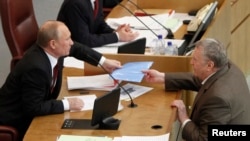Nationalist lawmakers want to ban foreign languages at the workplace — a rule that would leave some foreigners speechless, from menial laborers from former Soviet states to Western business executives in suits and ties.
Two deputies from flamboyant ultranationalist Vladimir Zhirinovsky's party introduced a bill on Thursday that would bar Russians and foreigners from speaking foreign languages on the job during working hours, state-run RIA news agency reported.
It cited a summary of the proposal as saying that many foreigners do not know Russian and “speak amongst themselves in their own language at the workplace during work hours, which makes the native [Russian] population indignant.”
That explanation suggested the bill is aimed mainly to control the speech of migrant workers from former Soviet republics of Central Asia and the Caucasus, whose growing presence in Russia has led to ethnic tension.
Some Russians accuse migrants of a lack of respect for Russian culture and say they should assimilate or leave.
Mindful of those opinions, President Vladimir Putin promised in a state-of-the-nation speech on Thursday to tighten control over labor migration, but he also said Russia must not undermine ties with the ex-Soviet states.
The concern about damaging relations with Moscow's closest geopolitical allies suggests the proposal is unlikely to pass in its present form. It would be seen by some in the West as draconian, casting further chill on Russia's investment climate.
Parliament is dominated by the United Russia party, which is loyal to Putin. Zhirinovsky and his misleadingly named Liberal Democratic Party, LDPR, support most Kremlin initiatives.
They sometimes produce initiatives that reflect popular opinion in exaggerated form, but which can then be repackaged in more acceptable terms and made into law.
Two deputies from flamboyant ultranationalist Vladimir Zhirinovsky's party introduced a bill on Thursday that would bar Russians and foreigners from speaking foreign languages on the job during working hours, state-run RIA news agency reported.
It cited a summary of the proposal as saying that many foreigners do not know Russian and “speak amongst themselves in their own language at the workplace during work hours, which makes the native [Russian] population indignant.”
That explanation suggested the bill is aimed mainly to control the speech of migrant workers from former Soviet republics of Central Asia and the Caucasus, whose growing presence in Russia has led to ethnic tension.
Some Russians accuse migrants of a lack of respect for Russian culture and say they should assimilate or leave.
Mindful of those opinions, President Vladimir Putin promised in a state-of-the-nation speech on Thursday to tighten control over labor migration, but he also said Russia must not undermine ties with the ex-Soviet states.
The concern about damaging relations with Moscow's closest geopolitical allies suggests the proposal is unlikely to pass in its present form. It would be seen by some in the West as draconian, casting further chill on Russia's investment climate.
Parliament is dominated by the United Russia party, which is loyal to Putin. Zhirinovsky and his misleadingly named Liberal Democratic Party, LDPR, support most Kremlin initiatives.
They sometimes produce initiatives that reflect popular opinion in exaggerated form, but which can then be repackaged in more acceptable terms and made into law.












